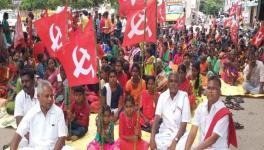TN: Whether Amma or Kalaignar, Will the Plight of Women Running Govt Community Kitchens Change?
Amma Unavagam in Valparai hill-station has set up the first trade union, their biggest worry is job loss and are demanding the government to regularise work.
In a recently held meeting with the Union minister for Food and Public Distribution Piyush Goyal, Tamil Nadu minister for Food and Civil Supplies R Sakkarapani urged the Centre to support the 650 Amma unavagam community kitchens under the Food Security Act. These subsidised community kitchens were initiated by former Chief Minister and All India Anna Dravida Munnetra Kazhagam (AIADMK) leader J Jayalalithaa in 2013, and the scheme has received much appreciation as a means to alleviate hunger.
In the same meeting, Sakkarapani announced that the state has planned to open 500 ‘Kalaignar Unavagams’ named after former Chief Minister and Dravida Munnetra Kazhagam (DMK) leader Kalaignar M Karunanidhi. In response, AIADMK leader O Panneerselvam said the move was an act of political vendetta aimed at oveshadowing the brainchild of J Jayalalithaa.
With the tussle between the two parties, there was much apprehension that the popular Amma canteens would be diluted after the DMK was voted to power in May 2021. Fortunately, amidst the pandemic, such immediate efforts were not made by the M K Stalin-led government. However, the fear persists among people who benefit from the scheme, particularly women from self-help groups (SHG) who run the kitchens.
NewsClick visited the Amma Unavagam in Valparai hill-station in Coimbatore district. It is the first and so far the only kitchen where a trade union has been set up. The 12 women in this kitchen formed a trade union affiliated to the Centre of Indian Trade Unions (CITU). The lack of job security is their biggest worry, and they are demanding the government to regularise Amma Unavagam workers.
PLIGHT OF PILLARS OF THE SCHEME
With promises of a great future, women from SHGs came forward to run the Tamil Nadu government’s subsidised canteens in 2013. Seven years later, the women work seven days a week for poor wages and no rights.
Renuka, one of the women running the Valparai unavagam, said, “The pay we get is not sufficient to run our households and educate our children. The husbands of many of us work in the tea plantations and earn only about Rs 5,000 a month. Our families are dependent on our earnings, some of us are even the breadwinners of their families.”
Another worker, Tilakavathi said, “My husband is handicapped, I have two children and my family fully depends on me. We work for 10 hours a day, and during the pandemic period, we worked for longer hours. We should be made permanent workers.”
Women at work in Amma community kitchen at Valparai.
Sivakami, another worker at the kitchen, said, “We work from 6.30 in the morning to 4 in the evening. I have to wake up at 4 am to complete household chores, and leave the house by 5:30 am to make it to work by 6:30 am. The streetlights are still on when I headout for work.”
During the first wave of COVID-19, many daily wagers lost their jobs, and had no money to buy even the essentials. So, the government started serving food free-of-cost at the Amma canteens. The state made an exception during the second wave and even allowed parcels as it was not possible to serve food at the canteens. This elongated the working day for the women and increased their work burden, but they received nothing in return.
In the Valparai canteen, the women usually serve only breakfast and lunch. During the intense lockdown period, they extended the service for dinner, thereby working for longer than 12 hours a day.
As the free bus ticket service is not extended to hill stations, these women do not benefit from this scheme. They spend Rs 20 per day on travel, and have been asking for bus passes to save up on a few hundred rupees every month.
THE NEED FOR UNION
When the Amma Unavagam scheme started in 2013, each volunteer was receiving Rs 250 per day. After sustained pressure from the women, it increased to Rs 325. Yet it is not sufficient and does not match up to the minimum wage.
Given that the women in the community kitchens work on behalf of their SHGs, they are not eligible for the benefits of a worker. Provident fund, state health insurance, minimum wage and even leave is not granted to them. They work under even fewer benefits than contract workers, yet they work as many, or even longer hours as employees.
Speaking on behalf of the SHG, Selvam said, “We are comfortable with the nature of the work, we are appreciated for preparing quality and tasty food, and that keeps us satisfied. But we have worked for seven long years, and we want confirmation of employment.”
People waiting to get tokens for food at an Amma mess. Image courtesy: Indian Express
“We want benefits such as PF, ESI and more importantly, job security, so the 12 of us formed the union. If we are suddenly told to leave the work, it would be very difficult for us,” said Sivakami, another worker at the unavagam.
Renuka said, “We were worried for our work, especially with the new government the fear persisted. However, we are hopeful now after setting up the union, we believe we can secure our jobs. Our work should be regularised, we want to work without the fear of losing our jobs. We go through a lot of stress everyday with this fear.”
Paramasivam, Secretary of CITU in Valparai said, “Rs 1,400 has to be deposited everyday in the bank by every Amma Unavagam. Valparai is a small town so it is not possible to make such money. Each of the workers was spending Rs 50 from her pocket to generate the funds. CITU intervened and ensured Valparai unavagam was exempted from this mandatory clause. It was after this that the women realised the benefits of having a union and formed one themselves.”
He also said, “One of the workers of the Unavagam was electrocuted while on work, and now she is not able to work in the kitchen. But because she needs the pay, she visits the unavagam everyday. If she had insurance benefits, she would have benefited from it and this situation would have been prevented.”
Each Amma Unavagam is run by 12 to 16 women, and they do all the necessary work from cleaning the venue, washing vessels, cooking and serving food to managing accounts. Yet they do not even have a welfare board, unlike construction and other workers.
Moreover, the safety of their jobs depends on the political party in power.
Get the latest reports & analysis with people's perspective on Protests, movements & deep analytical videos, discussions of the current affairs in your Telegram app. Subscribe to NewsClick's Telegram channel & get Real-Time updates on stories, as they get published on our website.
























